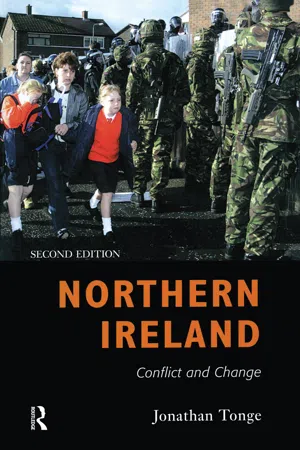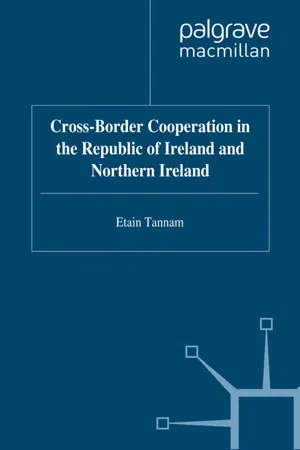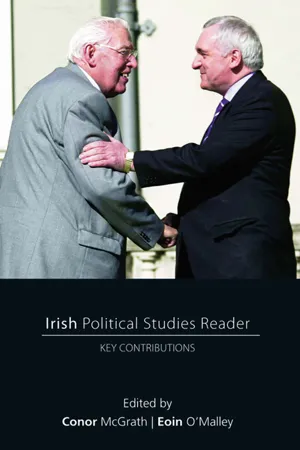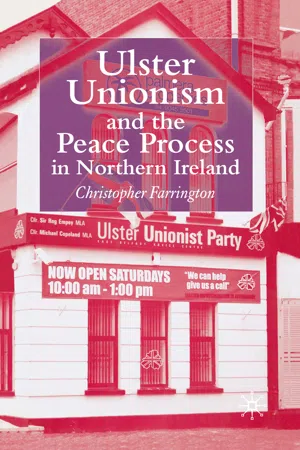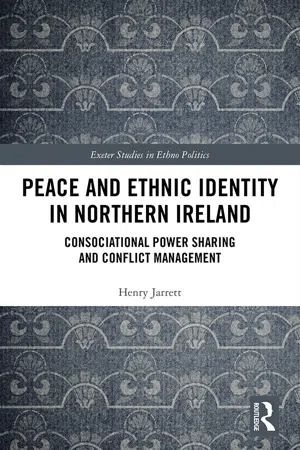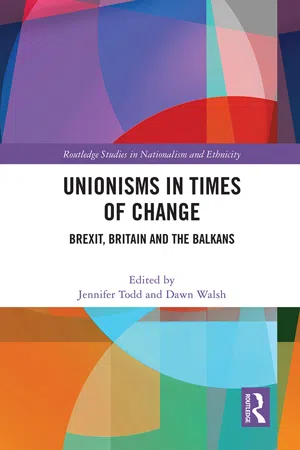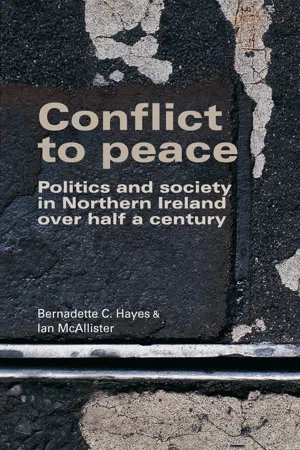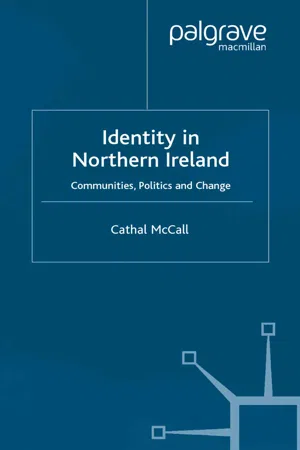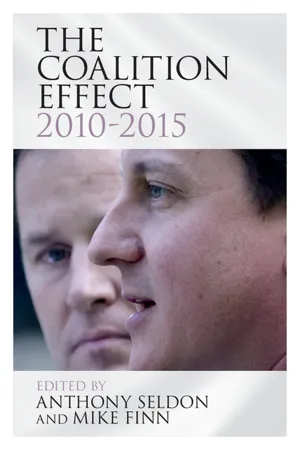Politics & International Relations
Democratic Unionist Party
The Democratic Unionist Party (DUP) is a political party in Northern Ireland that advocates for unionism and the maintenance of Northern Ireland's status as part of the United Kingdom. It has been a significant force in Northern Irish politics and has played a key role in the peace process. The party has been known for its conservative social policies and its influence on UK government decisions.
Written by Perlego with AI-assistance
Related key terms
1 of 5
9 Key excerpts on "Democratic Unionist Party"
- eBook - ePub
Northern Ireland
Conflict and Change
- Jonathan Tonge(Author)
- 2013(Publication Date)
- Routledge(Publisher)
The modernisation of the UUP is a long-term project dependent upon substantial internal reform and a consolidation of devolved government. Part of the uncertainty derives from short-term issues such as decommissioning and policing, but there remains considerable debate over the most appropriate form of devolved power-sharing.4.5.2 The Democratic Unionist Party (DUP)
Founded in 1971, the DUP attracted many initial recruits from the Protestant Unionist Party which existed for a brief period during 1969–71. Sharing the core beliefs of the UUP, the DUP is regarded as the advocate of a more hardline unionism. This includes persistent demands for vigorous security policies and a refusal to deal with Sinn Fein, except where unavoidable, within local councils and in the Assembly. At its formation, the DUP claimed that it would be right-wing on constitutional issues but left-wing on social policies, an appeal designed especially for working-class Loyalists.Opposed to power-sharing in the Sunningdale Agreement and the Constitutional Convention of the mid–1970s, the party benefited from the proposal of its rival for working-class votes, the Vanguard Party, to form a temporary partnership with the Nationalist-oriented Social Democratic and Labour Party. This idea led to the destruction of the Vanguard Party and the consolidation of the DUP as the UUP’s main rival.After participating in the Northern Ireland Assembly in 1982, the DUP strongly opposed the Anglo-Irish Agreement of 1985. It has been a persistent critic of the peace process, arguing that it was a flawed attempt to pacify insatiable Republican demands. As such, the party took no part in the negotiations leading to the Good Friday Agreement in 1998, even though it is desirous of devolved government for Northern Ireland. The party highlighted political and moral objections to the Agreement, with concerns over prisoner releases, policing changes and the presence of Sinn Fein in government all prominent. The party rotated its ministers within the Northern Ireland Executive, adding to the sense of impermanence sometimes associated with the new political institutions. Having outlined its objections from the outset, the DUP believed it could capitalise on increasing Unionist disillusionment with the Good Friday Agreement and reassert its role as the stoutest defender of the interests of the Unionist bloc. - E. Tannam(Author)
- 1998(Publication Date)
- Palgrave Macmillan(Publisher)
Faced with British attempts to reform the system, the unionist movement was divided in opinion as to what its response should be. In broad terms, the Political Parties and Cross-Border Cooperation 111 division was between the more hardline and extreme strand within the Ulster Unionist Party (UUP) and the more moderate strand. Broadly speaking, the Alliance Party, formed in 1970, represents the more mod- erate strand of unionism; the DUP represents the most extreme strand; and the UUP rests in between the two, but tends towards the DUP and battles with the DUP to win unionist votes. In 1981, the UDP was founded by John McMichael, emerging from the paramilitary Ulster Defence Association (UDA). Given its roots, it may appear to be the most extreme of the unionist parties. However, in the aftermath of the cease-fires its rhetoric appeared to be more moderate. Each party vies with the other for electoral support, and the DUP and UUP particularly attempt to out-do each other in a policy of 'no surren- der' to Anglo-Irish initiatives. Despite this competition, the two parties joined forces against the Anglo-Irish Agreement and produced a joint policy document, 'An End to the Drift' in 1987. They also joined together in deep opposition to the JFD in 1995. As the next section shows, although unionism is factionalised, Sinn Fein and the SDLP have been even more divided in their approach to the conflict in Northern Ireland. The Nationalist Parties: the SDLP and Sinn Fein The obvious and encompassing feature of nationalism in Northern Ire- land is that nationalists want a united Ireland. Beyond that feature, there is deep division over what constitutes the cause of the conflict in Northern Ireland.- eBook - ePub
Irish Political Studies Reader
Key Contributions
- Conor McGrath, Eoin O'Malley(Authors)
- 2007(Publication Date)
- Routledge(Publisher)
Cash (1996) is correct in distinguishing the broad response between exclusivist and inclusivist constructs of unionism. Inclusivism was at the forefront of unionism’s initial response, witnessed by widespread support for the Ulster Unionist Party (UUP) under the leadership of David Trimble. Building on ideas of civic unionism, Trimble projected a vision of politics that sought to build institutions with which both nationalists and unionists could identify.The idea of a new inclusive unionism was a core feature of those supportive of the Belfast Agreement. The UUP’s vision as a party projected a sense of Britishness defined as inclusive of all sections of Northern Ireland’s community and their ‘willingness to take part in the affairs of the British nation’ (UUP Westminster election manifesto, May 2001). This was in part matched by the political direction taken by key factions of loyalist paramilitarism. They too were promoting their own form of civic values, which was to gain increasing importance and prominence as they projected a coherent political position, most notably through the new loyalism of the Progressive Unionist Party.Such views have been marginalised within unionism. The parties representing loyalist paramilitaries have all but disappeared from the political radar, while the UUP, once regarded as the ‘natural’ party of government, has been humbled at the polls by the Democratic Unionist Party (DUP). Unionist hegemony has reconstructed around the leadership of Ian Paisley. There are several reasons for this switch in support, including the sincere belief increasingly held by many unionists that the peace process has brought about political and social decline and that the nationalist community has made huge political gains.Further, there is an embedded broad fear that the Union is under direct threat. Recent election results demonstrate that the DUP is capable of mobilising large sections of unionist opinion against any perceived ‘sell-out to the enemies of Ulster’. Crucially any perceived concessions within the political process are presented as a weakening of unionism’s core identity and a lessening of what it is to be British, Protestant and a unionist. The entire DUP political project is driven by the construction of discourses that re-emphasise and reinforce the central anxieties of many unionists. This discourse of fear and betrayal so straightforwardly projected by the DUP is non-party specific in its appeal to unionists. It is capable of arousing and mobilising across several of the factions of the unionist political bloc, and from within other sections of non-aligned unionists. - C. Farrington(Author)
- 2015(Publication Date)
- Palgrave Macmillan(Publisher)
The analysis of intra-system dynamics has been heavily influenced by the ethnic conflict paradigm, and the analyses of the DUP outlined in Chapter 3 link the DUP to identity politics. Indeed, the quantitative literature would tend to endorse such an argument. Analysts using statistical mapping techniques or social attitudes survey data have been unable to explain support for Unionist parties beyond the electorate's perceptions on the effectiveness of the party at defending the Union (Knox, Mcllheney and Osborne, 1995; Evans and Duffy, 1997). The stagnation of the DUP's vote was explained by the perceived ineffectiveness of Paisley to bring any real advantages to the Unionist community (Mitchell, 1995, 785). Under this reading, the growth of the DUP is 164 Ulster Unionism and the Peace Process in Northern Ireland Electoral Results 1973-2005 70 60 50 > 40 0 30 ?f. 20 10 0 Election -liE- % Unionist ---+- % Nationalist -+- % Others Figure 5.1 Unionist and Nationalist electoral performance 1973-2005. Source: Derived from figures in Elliott and Flackes (1999) and www.ark.ac.uk/elections. remarkably easy to explain: Unionists, uneasy with the political direction of Northern Ireland and particularly over the Agreement, have turned away from the moderate UUP towards the more reliable uncompromising DUP. The Unionist community thinks it can trust the DUP more than the increasingly fractured UUP and has endorsed its political message. This is highly plausible; support for the Agreement among Protestants has declined significantly and support for the DUP has grown and, as was noted earlier, a popular analysis in Northern Ireland is to explain the growth in the DUP vote in contingent terms, broadly explained by the direction of politics since the Agreement. In this reading, the growth of the DUP is the mirror of the growth of SF; both parties are seen as the most effective defenders of their community.- eBook - ePub
Peace and Ethnic Identity in Northern Ireland
Consociational Power Sharing and Conflict Management
- Henry Jarrett(Author)
- 2017(Publication Date)
- Routledge(Publisher)
The focus of the DUP’s pre-1998 election campaigns is especially strident and largely populist in its unionist appeal. Often the party’s manifestos were published as short leaflets or booklets, rather than more traditional longer, policy-driven documents. The election and electoral system used appear to make little difference to the way in which the DUP presents its positions, save for when explicit references are made to the parliament for which the respective election is being contested. The language and symbolism of the party’s manifesto for the 1992 Westminster election are particularly strident, with the need to ‘tackle terrorism’ (in this case, Irish republican paramilitarism) foregrounded (Democratic Unionist Party, 1992). It states that ‘nothing short of the elimination of the IRA shall suffice … they must be militarily defeated’. This theme is continued throughout, with calls for Sinn Fein to be proscribed and for the Ulster Defence Regiment (UDR) to be ‘given a meaningful role in the defence of Ulster’. It is also keen to highlight the link between Sinn Fein and the IRA, and to present the two as synonymous.The manifesto emphasises the DUP’s opposition to a role for the Republic of Ireland in Northern Ireland’s affairs and claims to speak for the unionist community in doing so. There is, nevertheless, some discussion of policies, though these are usually pro-union and focused explicitly on the unionist bloc, such as opposing ‘the ban on the display of the union flag and portraits of the Royal Family in the workplace’. The party clearly draws a distinction between pro-union and pro-British government, though with some criticisms made of the latter. For example, it accuses the government of ‘turning Sunday into a working day’ as part of its ‘Sunday is Special’ campaign against what was to become the Sunday Trading Act of 1994. This is evidence of the DUP’s religious foundations continuing to have a key impact on its policy formation during the early 1990s. The visual symbolism of the manifesto is profoundly unionist, with a red and blue colour scheme throughout and the inclusion of the red hand of Ulster on the party emblem.Whilst this particularly strident presentation of its unionist credentials is perhaps to be expected for campaigns for elections to the Westminster Parliament, it is thought that this may be toned down for European and local elections contested using PR-STV, as the DUP was a comparatively small party at the time and it would have been in its interest to attract transfers from the more moderate UUP. This incentive, however, was evidently not realised, with campaigns for these elections demonstrating little deviation from those for Westminster elections in terms of their single-identity focus. The DUP’s 1994 European election manifesto is intensely unionist in focus and foregrounds preventing ‘Dublin interference’ in Northern Ireland, an issue largely outside of the remit of the EU (Democratic Unionist Party, 1994). It presents what the party perceives as the ‘emboldened’ and ‘more united than ever before’ Irish Republic as a threat to the constitutional position of Northern Ireland, which is further emphasised in statements such as ‘the SDLP leader (John Hume) and the leader of IRA/Sinn Fein (Gerry Adams) have joined forces with Dublin to pursue their common goal of a united Ireland’. This demonstrates a determination to emphasise what the party perceives to be the Republic of Ireland’s congruence with the nationalist community in the North and to package this as a combined threat to unionism. - eBook - ePub
Unionisms in Times of Change
Brexit, Britain and the Balkans
- Jennifer Todd, Dawn Walsh(Authors)
- 2021(Publication Date)
- Routledge(Publisher)
Despite amounting to only one per cent of the Protestant population, Free Presbyterians are (just) the largest category within the DUP. Of that Free Presbyterian contingent, less than half were brought up as such, many being ‘born again’ converts. However, whilst a majority of the DUP pre-GFA was Free Presbyterian, the number of such joiners has been low in the last two decades, falling even before Ian Paisley stood down from the leadership of that Church and the DUP in 2008. The DUP’s former MP, Nigel Dodds, claimed a modest contemporary religious outlook for his party, placing it ‘in the great tradition of the European parties where Christian Democracy is a mainstream political view’ (interview, July 3, 2013). The DUP also saw a large influx (one-in-five of its total membership) of non-Free Presbyterian defectors from the UUP in the decade following the GFA. The legacy of Paisley’s leadership, in which the DUP operated as a political vehicle often espousing the worldview of that church, remains evident nonetheless, when contrasted with the composition of the UUP, whose members eschewed the fundamentalist Free Presbyterian variety of Protestantism in favour of mainstream denominations. The UUP’s Church of Ireland and Presbyterian percentages are in line with those found among Northern Ireland’s Protestant population.The virtual absence of Catholics in both unionist parties is stark. Compositionally at least, both unionist vehicles are Protestant parties, with Catholic membership below one per cent in each. The imbalance is replicated in electoral politics. At the 2019 General Election, the percentage of Catholics voting DUP or UUP was below one per cent (Tonge, Evans, Hayes, Mitchell, & Shirlow, 2020 ). Successive Northern Ireland Life and Times surveys have highlighted the paradox of sizeable acquiescence among Catholics for Northern Ireland’s place in the UK being juxtaposed with rejection of parties backing that Union. According to the 2016 survey, zero per cent of Catholics described themselves as unionists. Yet the same survey indicated that 41 per cent of Catholics believed that the best long-term solution for Northern Ireland was devolved government within the UK, a greater figure than the 35 per cent backing a united Ireland (Northern Ireland Life and Times survey, 2016 ). Alternatively, the extent of Catholic unionism can be questioned. The 2019 Northern Ireland General Election study indicated that, if offered a choice between remaining part of the UK or becoming part of a united Ireland, only 14 per of Catholics preferred the UK option, 61 per cent favouring unity (Tonge et al., 2020 - eBook - ePub
Conflict to peace
Politics and society in Northern Ireland over half a century
- Bernadette Hayes, Ian McAllister(Authors)
- 2015(Publication Date)
- Manchester University Press(Publisher)
The elections are as follows: 1969, Stormont; 1970, February and October 1974, 1979, 1983, 1987, 1992, 1997, 2001, 2005, 2010, Westminster; 1973, 1975, 1982, 1996, 1998, 2003, 2007, 2011, Assembly (in 1975 Convention, in 1996 Forum); and 1973, 1977, 1981, 1985, 1989, 1993, 1997, 2001, 2005, District Council. In 1969 and 1970, the DUP results are for Protestant Unionist and in June 1973 Democratic Unionist Loyalist CoalitionSources: Elliott and Flackes, 1999 ; http://www.ark.ac.uk/elections/The party system within the Catholic community is equally bifurcated, with again one party in decline and one party displaying an incremental increase. Between 1920 and 1969, the main representative of the Catholic community was the Nationalist Party, the Northern Ireland remnant of the Irish Parliamentary Party that had dominated nationalist politics from the 1880s to the First World War. In Northern Ireland, the Nationalist Party was characterized by periodic abstention from parliament, a concern with local, clientelist politics, and ambiguity towards the use of violence by the IRA. The rise of the civil rights movement effectively sidelined the Nationalist Party and made the creation of a new party, capable of effectively representing the nationalist community, more pressing (Purdie, 1990 ). In August 1970, the SDLP was formed, bringing together civil rights leaders and members of the National Democratic Party, the Northern Ireland Labour Party and the Republican Labour Party (McAllister, 1977 ; Murray, 1998 ; Murray and Tonge, 2005 ).From the outset, the SDLP represented an uneasy balance between traditional nationalist goals and socialist ideology. Although the party recognized that the constitutional position of Northern Ireland could only be changed by the consent of the majority, several of the original founders, notably John Hume (who was party leader from 1979 to 2001), clearly viewed the SDLP as a means of advancing nationalist goals without resorting to political violence. The party’s socialist credentials are reflected in its membership of the Socialist International and its links to the British and Irish labour parties, as well as to other European centre-left parties. The party’s first leader, Gerry Fitt, was a committed socialist, and he resigned from the party in 1979 over the party’s desire to include the Irish government in any future political settlement in Northern Ireland, a key principle for the nationalist wing of the party. - eBook - PDF
Identity in Northern Ireland
Communities, Politics and Change
- C. McCall(Author)
- 1999(Publication Date)
- Palgrave Macmillan(Publisher)
I don’t think anyone could say the Unionists have the Brit- ish government in their hip pocket any more. The Ulster Unionists are a very small regional political party with very little financial resources. We don’t have any other support and that is one of our major problems. You are taking on the Department of For- eign Affairs in Dublin or the Foreign Office in London or what- ever and you have got to be mighty careful when you are dealing with guys like that. 170 Identity in Northern Ireland UUP interviewees are tentatively developing an interpretation of structural change and show some signs of adapting to postmodern concepts like ‘consent’ and ‘agreement’, with their focus on com- munity rather than on territory. Reg Empey still shares the DUP perception that the ‘Euro-speak’ pioneered by John Hume is merely a new dialect aimed at achieving a modern nationalist ambition. However, Jim Nicholson admits that an articulation which implies a regional rather than a nation-state context may be a useful con- tingent in resolving the political conflict in Northern Ireland. Never- theless, he envisages that more concrete evidence of structural change is required before such a context can be absorbed into the politi- cal consciousness of communal identities in Northern Ireland. In the meantime, he is anxious that UUP leaders avoid becoming too far removed from the modernist perceptions of Ulster Unionist identities. It is these modernist perceptions, in turn, that maintain a rejection of major cross-border innovations, especially on the island of Ireland. Jim Nicholson recognizes that a ‘peace process’ presents new challenges to Ulster Unionists. However, some political commen- tators have expressed scepticism about the ability of Ulster Union- ist politicians to adopt an innovative and proactive outlook when confronted with opportunities created by the ‘peace process’ of the 1990s. - eBook - PDF
- Anthony Seldon, Mike Finn(Authors)
- 2015(Publication Date)
- Cambridge University Press(Publisher)
In Scotland between 1999 and 2007, whilst in coalition, the party actually grew. The union in Northern Ireland appears more secure in 2015 than at any time since the 1950s – from a unionist perspective there is no UK Government pressing for change or Irish republican armed struggle any longer. 30 The DUP–Sinn Fein diarchy became fur- ther embedded. The clashes that have taken place are over identity issues and symbolic and traditional customs – the flying of the union flag over Belfast City Hall, the perennial marching season clashes and debates about the status of languages. The coalition government faced governments in all three per- ipheries without any Conservative or Liberal Democrat representation. This represented a basis for antagonistic relations. However, the post- 28 Katherine Dommett, ‘A miserable little compromise: Why the Liberal Democrats suffered in coalition’, LSE Blog (accessed at http://blogs.lse.ac.uk/politicsandpolicy/ a-miserable-little-compromise-why-the-liberal-democrats-have-suffered-in-coalition, 7 November 2014). 29 George Parker and Kiran Stecey, ‘Nick Clegg says the Lib Dem aim is to bring down the two-party system’, Financial Times, 18 September 2013. 30 Patterson, ‘Unionism’, p. 254. 103 / The coalition beyond Westminster devolution pattern of parties and governments working together with the wheels oiled by the civil service has continued. Continued constitutional tinkering Smoother territorial relations also partly reflected the post-1997 con- stitutional flexibility of the UK Government. Referendums have estab- lished themselves firmly as part of the conventional constitutional landscape of British politics in a system that has traditionally viewed them with suspicion. The 2011 AV referendum was only the second UK-wide one ever held (the first being the 1975 ‘Common Market’ – as the EU was then referred to – vote). In Northern Ireland, Wales and Scotland, they have been far more common.
Index pages curate the most relevant extracts from our library of academic textbooks. They’ve been created using an in-house natural language model (NLM), each adding context and meaning to key research topics.
